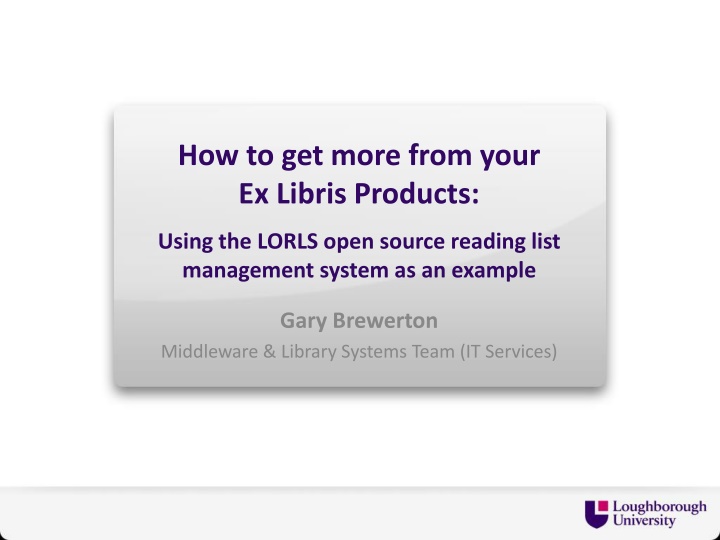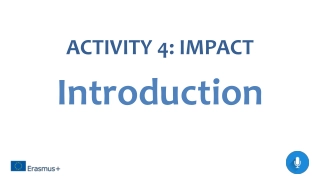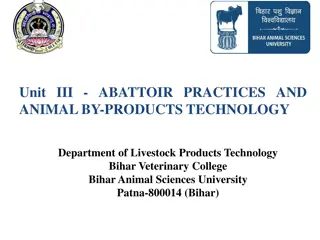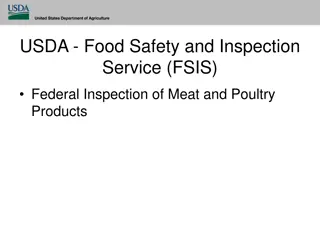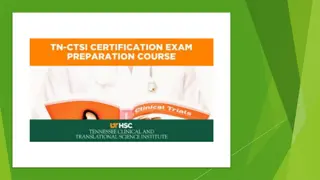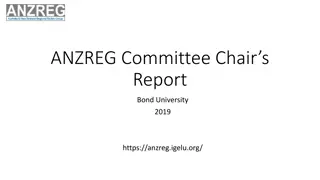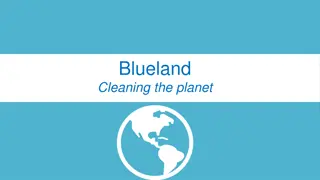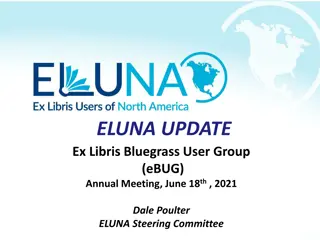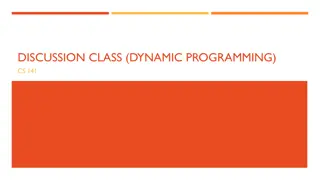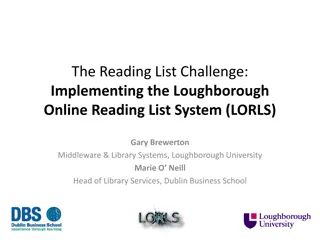Maximizing Ex Libris Products through the LORLS System
Explore how Loughborough University leveraged the LORLS open-source reading list management system to enhance online access to reading lists. Follow their journey from system launch to integration with Aleph, showcasing innovative solutions and improvements along the way.
Download Presentation

Please find below an Image/Link to download the presentation.
The content on the website is provided AS IS for your information and personal use only. It may not be sold, licensed, or shared on other websites without obtaining consent from the author.If you encounter any issues during the download, it is possible that the publisher has removed the file from their server.
You are allowed to download the files provided on this website for personal or commercial use, subject to the condition that they are used lawfully. All files are the property of their respective owners.
The content on the website is provided AS IS for your information and personal use only. It may not be sold, licensed, or shared on other websites without obtaining consent from the author.
E N D
Presentation Transcript
How to get more from your Ex Libris Products: Using the LORLS open source reading list management system as an example Gary Brewerton Middleware & Library Systems Team (IT Services)
Background: journey into the unknown In 1999 Loughborough University s Learning & Committee decided that reading lists should be made available online to students Key requirements: Allow academics to maintain their own online reading lists Allow students to easily check Library availability of resources on reading lists Library Systems Team was tasked with developing the solution
Background: launch of reading list system We launched the Loughborough Online Reading List System (LORLS) in June 2000 alongside our existing LMS, although we were out to tender for a new LMS To add new items to a reading list, academics could either manually fill in an online form or enter an ISBN and pull data from the LMS using a bespoke Perl CGI script Provided [Check Library holdings] links against all citations to deep link into Library catalogue (regardless of holdings)
Change of LMS: getting things working again Less than a year after implementing LORLS the Library replaced the prior LMS with Aleph Getting LORLS to work with Aleph was (thankfully) very straight forward Supported deep linking into the catalogue using REST (e.g. http://aleph.lboro.ac.uk/F/?func=find-b&request=1565922840) Provided a Z39.50 interface to the LMS which allowed us to standardize our method for data retrieval - O# cr@p!
Change of LMS: additional improvements With a standard (Z39.50) data retrieval method we were able to create an overnight job to pre-check library holdings (no more dead ends) Alongside Aleph the Library also purchased this weird SFX thingy (very easy to integrate)
Example: subroutine to generate OpenURL (v0.1) sub generateOpenUrl{ my ($metadata)=@_; my $openURL='http://sfxeu10.hosted.exlibrisgroup.com/loughborough?'; my @details; if($metadata->{'genre'}){push @details, "genre=".uri_escape($metadata->{'genre'})} if($metadata->{'issn'}){push @details, "issn=".uri_escape($metadata->{'issn'})} if($metadata->{'isbn'}){push @details, "isbn=".uri_escape($metadata->{'isbn'})} if($metadata->{'volume'}){push @details, "volume=".uri_escape($metadata->{'volume'})} if($metadata->{'issue'}){push @details, "issue=".uri_escape($metadata->{'issue'})} if($metadata->{'journalTitle'}){push @details, "title=".uri_escape($metadata->{'journalTitle'})} if($metadata->{'articleTitle'}){push @details, "atitle=".uri_escape($metadata->{'articleTitle'})} if($metadata->{'startPage'}){push @details, "spage=".uri_escape($metadata->{'startPage'})} if($metadata->{'endPage'}){push @details, "epage=".uri_escape($metadata->{'endPage'})} $openURL.=join('&',@details); return $openURL; }
Example: invoking the OpenURL subroutine #!/usr/bin/perl use URI::Escape; my $item={ 'genre'=>'article', 'issn'=>'0305-5728', 'issue'=>'4', 'volume'=>'33', 'journalTitle'=>'VINE', 'articleTitle'=>'From local project to open source: a brief history of the Loughborough Online Reading List System (LORLS)', 'startPage'=>'189', 'endPage'=>'195' }; print generateOpenUrl($item)."\n";
Redevelopment: time to re-think reading lists In 2007 we started considering how to re-develop LORLS, development began in 2009 and we released the new version in February 2011 Key considerations were: Greater flexibility (e.g. support organisational structures other than Loughborough University) Better interface design (e.g. drag and drop re-ranking) Embedding of additional content in system (e.g. library holdings, book covers)
Web services: getting at the information Re-developing LORLS allowed us to take advantage of web services For example: extracting holdings data from the Aleph X-Server in XML format, and embedding it in the reading list screen
Example: Aleph X-Server call and results http://aleph.lboro.ac.uk/X?op=circ-status&sys_no=001212234&library=lbo01 &user_name=<USERNAME>&user_password=<PASSWORD> <circ-status> <item-data> <z30-description/> <loan-status>Long loan</loan-status> <due-date>On Shelf</due-date> <due-hour>22:00</due-hour> <sub-library>Library</sub-library> <collection/> <location>006.76/LEA</location> <pages/> <no-requests/> <location-2/> <barcode>0403866928</barcode> <opac-note/> </item-data> <item-data> <z30-description/> <loan-status>Long loan</loan-status> <due-date>25/10/13</due-date> <due-hour>22:00</due-hour> <sub-library>Library</sub-library> <collection/> <location>006.76/LEA</location> <pages/> <no-requests/> <location-2/> <barcode>0403866936</barcode> <opac-note/> </item-data> <session-id> 8D7DJ2B34RG697D 2QIS8R21EI6FKR2 </session-id> </circ-status>
Purchasing prediction: Big-ish data Step-by-step guide to how it works 1. Identify items to check (e.g. recently edited items) from LORLS 2. Validate ISBNs 3. Estimate initial copies required from item importance and student numbers in LORLS 4. Drop books which have sufficient copies in stock according to Aleph 5. Find costs (from Aleph, Amazon, GoogleBooks, etc.) 6. Discard books without available prices 7. Get recent loan information from Aleph 8. Drop underused items 9. Identify latest edition of books 10. Round robin purchasing algorithm to keep purchasing suggestions within Aleph budget 11. Output results (onscreen or email)
bX: adding article recommendations When the Library purchased Primo they also purchased bX Used with Primo and SFX Added option to LORLS dashboard to see suggested articles for inclusion and allow editors to append to a reading list with a single click
Summary: interactions between LORLS and EL stuff Deep linking into the Aleph catalogue and Primo using REST Z39.50 data retrieval from Aleph OpenURLs (SFX) Web services Aleph X-server (REST and XML) bX (REST and XML) And some bespoke Perl CGI scripts
Conclusion: what can we determine from this? Ex Libris have a good history of innovating, adopting and adhering to open standards They understand that their productions don t operate in a vacuum and may be only part of the solution By utilising the various methods made available by Ex Libris you can leverage additional value from your products If one institution has done it, maybe you can too
Credits: thank you to the academy Huge thanks to my colleague Jason Cooper for supplying the example code Aleph, SFX, Primo and bX are all products from Ex Libris LORLS is an open source RLMS (Resource/Reading List Management System) produced by Loughborough University and freely available from http://blog.lboro.ac.uk/lorls
The End: or is it? Any questions?
